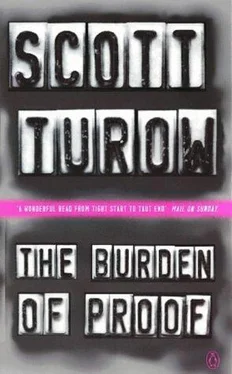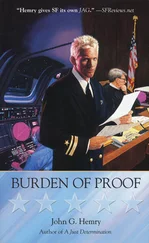Scott Turow - The Burden of Proof
Здесь есть возможность читать онлайн «Scott Turow - The Burden of Proof» весь текст электронной книги совершенно бесплатно (целиком полную версию без сокращений). В некоторых случаях можно слушать аудио, скачать через торрент в формате fb2 и присутствует краткое содержание. Жанр: Детектив, на английском языке. Описание произведения, (предисловие) а так же отзывы посетителей доступны на портале библиотеки ЛибКат.
- Название:The Burden of Proof
- Автор:
- Жанр:
- Год:неизвестен
- ISBN:нет данных
- Рейтинг книги:3 / 5. Голосов: 1
-
Избранное:Добавить в избранное
- Отзывы:
-
Ваша оценка:
- 60
- 1
- 2
- 3
- 4
- 5
The Burden of Proof: краткое содержание, описание и аннотация
Предлагаем к чтению аннотацию, описание, краткое содержание или предисловие (зависит от того, что написал сам автор книги «The Burden of Proof»). Если вы не нашли необходимую информацию о книге — напишите в комментариях, мы постараемся отыскать её.
The Burden of Proof — читать онлайн бесплатно полную книгу (весь текст) целиком
Ниже представлен текст книги, разбитый по страницам. Система сохранения места последней прочитанной страницы, позволяет с удобством читать онлайн бесплатно книгу «The Burden of Proof», без необходимости каждый раз заново искать на чём Вы остановились. Поставьте закладку, и сможете в любой момент перейти на страницу, на которой закончили чтение.
Интервал:
Закладка:
Klonsky began questioning Margy, even while Stern was reviewing her nonsubject letter. It was signed by the U.S. Attorney himself and assured Margy that she was not suspected of any criminal involvement, assuming she told the truth before the grand jury. Stern put the letter in his case and looked on as Klonsky worked. She asked Margy questions, all of them routine, and wrote down the answers on a yellow pad.
Wearing her prosecutor's hat, Sonia was like most of her colleagues, relentless, humorless, intense. Her pace was sufficiently methodical that Stern actually grew hopeful that the matter of the missing documents might not come up.
That would allow him to have a pointed conversation first with Mr.
Hartnell. But with only a few minutes remaining before they were scheduled to appear at the grand jury, Klonsky removed her tissue copy of the subpoena from the file and went through it, item by item. When Margy handed over the statements for the Wunderkind account, she added brightly, "That's it."
"That's it?" asked Klonsky, with an immediate look of apprehension. She glanced back to her papers.
Stern, for the first time, spoke up. Somewhere, he said, there was a misunderstanding. The various account-opening documents-signature forms, applications, et cetera-seemed to have been misplaced and could not presently be located.
A diligenf search had been conducted by Ms. A1-lison and would be continued, Stern stated, under his direction.
"They're gone?" asked Klonsky. "TrashedT'
Margy started to speak, butStern reached out to grab her wrist where a heavy bracelet lay. It was far too early, said Stern, to assume the documents could not be located.
The. subpoena had been served barely three weeks agO, and MD was a substantial company with hundreds of employees and more than one offic "I don't believe this," Klonsky said. She largely ignored Stern and put a series of questions to Margy, identifying the documents, the copies, the places they were stored. She extracted, in more precision than Stern had, the details. of Margy's search. Conducting this inquiry, Klonsky was rigid and intent behind her desk. WhateVer her occasional geniality, Ms. Klonsky, when provoked, was quick to anger, She looked at Stern. "I'm going to have to talk io Stan about this."
"Sonia," said Stern, "again, I think you are leaping unnecessarily-She cut him off with an ill-tempered wave of her hand, Clad in her familiar blue jumper, she bumped her belly a bit against her desk as she climbed out from behind her chair and led the way downstairs to the grand jury.
When the judges had deserted the new federal building, they left the grand jury behind. The defense lawyers protested this propinquity to the United States Attorney's Of-rice, but it was recognized as vain posturing. For all practical purposes, the grand jury belonged to the prosecutors. An unmarked door in the corridor a floor below led into what looked like a doctor's reception room; it held the same inexpensive furniture, with cigarette burns and splintered veneers, as in the U.S.
Attorney's Office upstairs. Behind two additional dOOrs lay the grand jury rooms themselves.
Stern had often peeked inside. It did not look like much: a tiny raised bench at the front of the room and rows of tiered seats, like a small classroom. The twenty-three grand jurors, who had been called out of the regular jury pool to help the prosecutors determine whether they had enough evidence to try someone for a crime, tended to be union workers of one kind or another who had no store to mind, or else the retired, women at home who could manage the time, or frequently those out of work who valued the $30 daily fee.
To Stern, the grand jury, purportedly intended to protect the innocent, remained one of the preeminent fictions of the criminal-justice scheme.
Occasionally, the defense bar was warmed by tales of a renegade grand jury that returned a no bill or two, or quarreled with the prosecutors about a case. But usually the jurors deferred, as one would expect, to the diligent young faces of the U.S. Attorney's Office.
By all reports, the grand jurors sat knitting, reading papers, picking at their nails, while a given individual, brought here by the might and majesty of the United States, was grilled at will by the Assistants.
"Remember I am here," he told Margy. She strolled inside, hauling her briefcase, and did not look back. She remained in poor humor with him.
Klonsky also was put out, and, perhaps without meaning to, slammed the door on Stern as she called the session to order.
The proceedings were secret. The room had no windows and a single door.
The grand jurors, the prosecutors, the court reporter could not disclose what had occurred, unless there was a trial, When the government was required to reveal the prior testimony of witnesses. In this federal district, commendably, there were seldom leaks of grand jury matters and much went on here that was never heard about again, a comforting fact for those subjecfed to baseless or even unprovable allegations. But it was the same respectable principle of secrecy that was cited to bar the witness's lawyer from attending; Stern had only the right to walt at the door, in the fashion of a well-trained dog. The witness, under no bans of confidentiality, could leave if need be after every question to ask the lawyer's advice.
But intimidated by the setting, and eager to appease the interrogator, they seldom did so. His clients usually left Stern maintaining his vigil at the door, his case and hat in hand, his stomach grinfling.
Sometimes, particularly with male voices of a certain timbre, Stern found that the seat nearest to the grand jury room enabled him, if he moderated his breathing and others outside were not gabbing, to overhear the proceedings word for word. Today he was not as fortunate. Barney Hill, the deputy court clerk who slotted fame and filled out attendance forms for witnesses, chatted to Stern about the Trappers? and the women's voices did not seem to carry as well through the heavy door. He could hear Klonsky at a certain pitch and the confident tone of Margy's response.
After fifteen minutes, the door banged open and both women. emerged. They were finished. Predictably, Margy had oho sen not to visit with her lawyer.
"I'm still concerned about those documents," said Klon-sky from the threshold of the grand jury room, with a number of the grand jurors milYmg about behind her. "Ms. Allison's going to be looking for them again."
"Of course," said Stern.
"As far I'm concerned, we're beginning an investigation for an O.O.J,"
Obstruction of Justice.
Stern once more attempted to mollify her, but Klonsky, with half a smile at his familiar excuses, waved him off. She repeated again that she was going to talk to the U.S.
Attorney, and headed out, apparently to do just that.
Stern, left with Margy, pointed her to one of the narrow rooms immediately beside the grand jury chamber which were set aside for witnesses' consultations with their counsel.
The room, six by. ten, was bare; it contained a worn table and two chairs, and the gray walls were marred and filthy.
Stern's practice, invariable over the decades, was to debrief his clients right here, while their memories were fresh, question by question.
Stern closed the door and Margy sat, frosty with him but otherwise calm. He asked how it had been:
"Fine," she said serenely. "I lied."
Stern stood with his hand on the'knob of the door. This happened now and then, of course. Not as often as was commonly imagined. But now and then. A client chUCks up her chin and frankly admits to committing a felony.
Notwithstanding, he promptly felt feverish, weak.
He sat down, facing her. She remained bitter and. cross.
"May I ask," said Stern, "in what manner you provided incorrect information?"
Читать дальшеИнтервал:
Закладка:
Похожие книги на «The Burden of Proof»
Представляем Вашему вниманию похожие книги на «The Burden of Proof» списком для выбора. Мы отобрали схожую по названию и смыслу литературу в надежде предоставить читателям больше вариантов отыскать новые, интересные, ещё непрочитанные произведения.
Обсуждение, отзывы о книге «The Burden of Proof» и просто собственные мнения читателей. Оставьте ваши комментарии, напишите, что Вы думаете о произведении, его смысле или главных героях. Укажите что конкретно понравилось, а что нет, и почему Вы так считаете.












